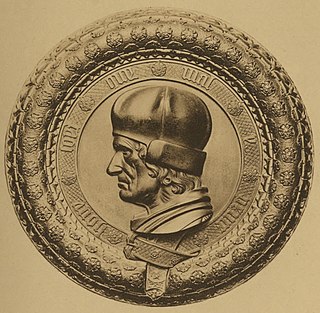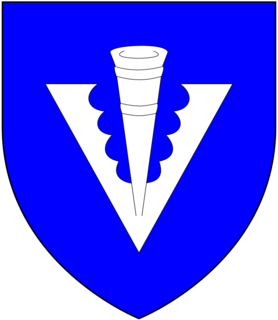Related Research Articles
James Beaton (1473–1539) was a Roman Catholic Scottish church leader, the uncle of David Cardinal Beaton and the Keeper of the Great Seal of Scotland.

Edward Rainbowe or Rainbow (1608–1684) was an English academic, Church of England clergyman and a noted preacher. He was Master of Magdalene College, Cambridge, Vice-Chancellor of the University of Cambridge and Bishop of Carlisle.

Henry King was an English poet who served as Bishop of Chichester.

Ranulf II, 4th Earl of Chester (1099–1153), was an Anglo-Norman baron who inherited the honour of the palatine county of Chester upon the death of his father Ranulf le Meschin, 3rd Earl of Chester. He was descended from the Counts of Bessin in Normandy.
Thomas Ruthall was an English churchman, administrator and diplomat. He was a leading councillor of Henry VIII of England.

William Talbot was an English Anglican bishop. He was Bishop of Oxford from 1699 to 1715, Bishop of Salisbury from 1715 to 1722 and Bishop of Durham from 1722 to 1730.
Robert Beaumont was Master of Trinity College Cambridge from 1561 to 1567 and twice Vice-Chancellor of the University of Cambridge. During this time, he commissioned Hans Eworth to copy the 1537 Hans Holbein portrait of King Henry VIII. This copy was bequeathed to Trinity College where it hangs to this day.

Sir Thomas Lovell, KG was an English soldier and administrator, Speaker of the House of Commons, Secretary to the Treasury and Chancellor of the Exchequer.
Achilles Daunt (1832–1878) was a noted Irish preacher and homilist, and Anglican dean of Cork.
Sir Henry Redford or Retford was a Knight of the Shire, Sheriff of Lincolnshire and the Speaker of the House of Commons.
Thomas Bainbrigg (Bainbridge) was an English college head.
Robert Pink D.D. was an English clergyman and academic, a supporter of William Laud as Warden of New College, Oxford, and later a royalist imprisoned by Parliament.
Adam of Damerham (sometimes Adam of Domerham, was a Benedictine monk of Glastonbury Abbey, who wrote a history of the abbey, and was active in the ecclesiastical politics of his time.
Ralph Button was an English academic and clergyman, Gresham Professor of Geometry, canon of Christ Church, Oxford under the Commonwealth, and later a nonconformist schoolmaster.
William Lancaster D.D. (1650–1717) was an English churchman and academic, Provost of The Queen's College, Oxford.

William Bradbridge (1501–1578) was an English bishop of Exeter.
Richard Bromsgrove, was a monk of the Benedictine abbey of Evesham.
William Franklyn (1460–1556) was an English churchman, who became dean of Windsor.
Sir Robert de Berkeley, 3rd feudal baron of Berkeley was an Anglo-Norman baron and justice.
References
- . Dictionary of National Biography . London: Smith, Elder & Co. 1885–1900.
Attribution
![]() This article incorporates text from a publication now in the public domain : "Ralph (d.1123)". Dictionary of National Biography . London: Smith, Elder & Co. 1885–1900.
This article incorporates text from a publication now in the public domain : "Ralph (d.1123)". Dictionary of National Biography . London: Smith, Elder & Co. 1885–1900.
| Political offices | ||
|---|---|---|
| Preceded by Waldric | Lord Chancellor 1107–1123 | Succeeded by Geoffrey Rufus |